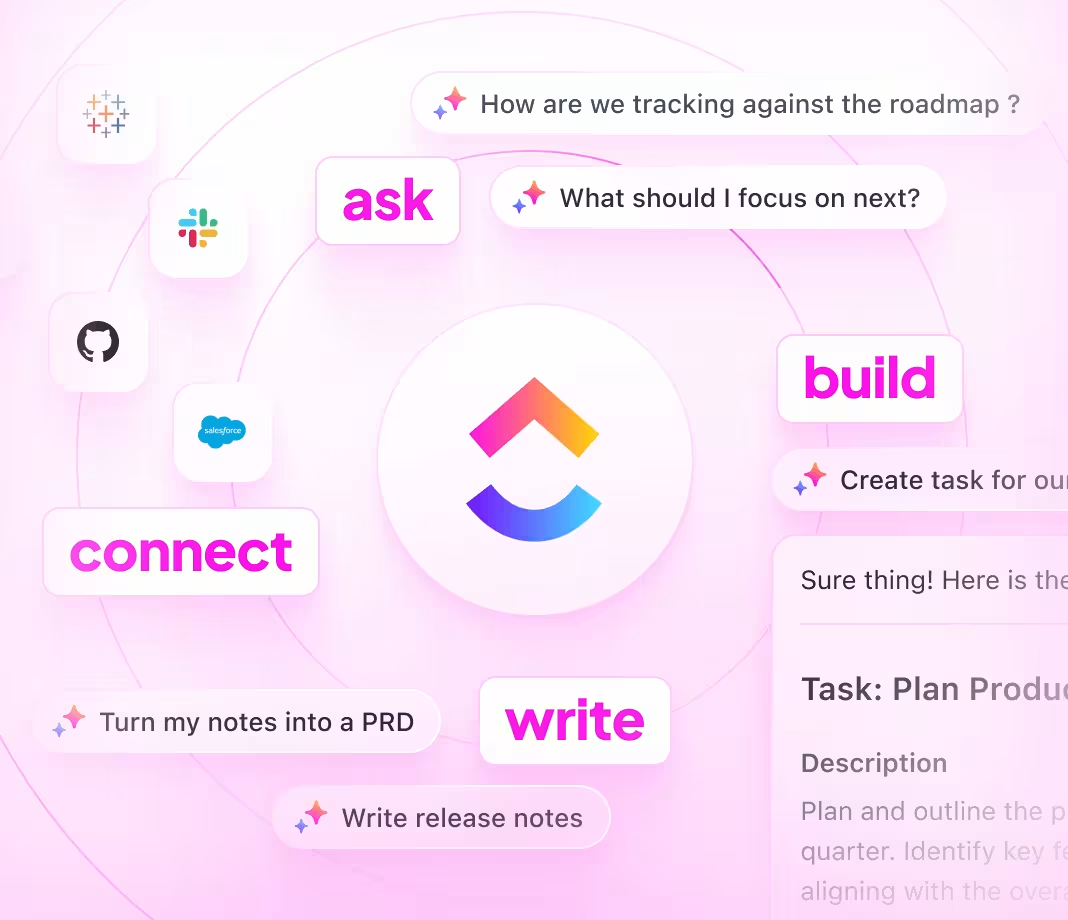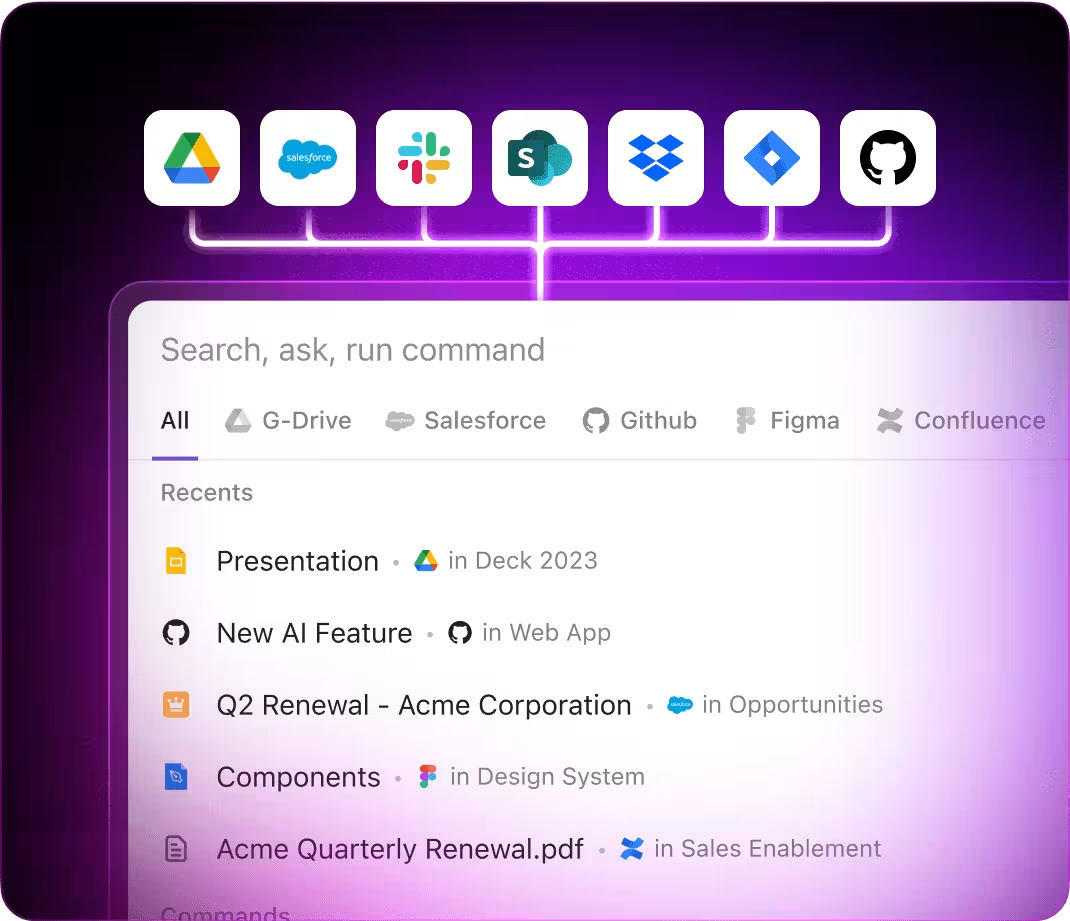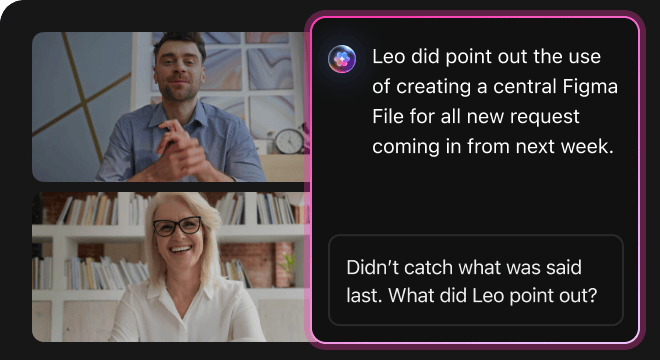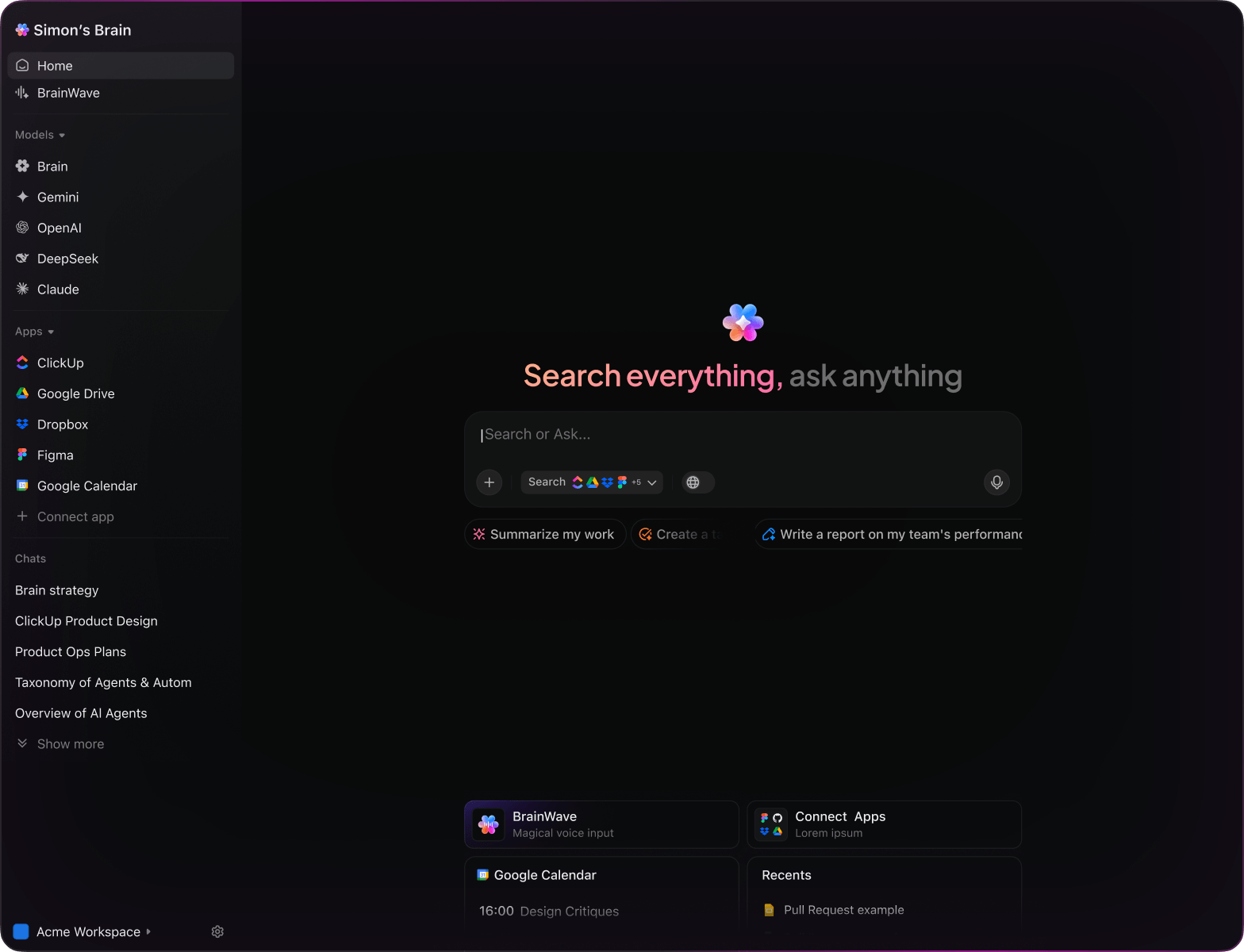AI Medical Research
Top AI Prompts for Medical Research Teams
Accelerate discoveries, organize complex data, and enhance collaboration in your medical projects with ClickUp AI.

Trusted by the world’s leading businesses
AI in Medical Research
Revolutionizing Medical Research with AI Prompts in ClickUp Brain
Advancing healthcare breakthroughs depends not only on experiments but also on managing vast data and collaboration.
Medical research spans hypothesis generation, clinical trial design, data analysis, and regulatory documentation—each step generating extensive notes, reports, and deadlines. AI prompts are now pivotal in this complex environment.
Researchers leverage AI to:
- Quickly identify relevant studies and emerging trends
- Generate draft protocols, data summaries, and patient consent forms
- Interpret dense regulatory guidelines and compliance requirements
- Transform unstructured observations into clear outlines, task lists, or project milestones
Integrated into familiar tools like documents, whiteboards, and project trackers, AI in ClickUp Brain acts as a proactive partner—shaping raw insights into structured, actionable research plans.
ClickUp Brain Compared to Conventional Solutions
Why ClickUp Brain Stands Out
Integrated, intelligent, and instantly accessible—ClickUp Brain lets you focus on breakthroughs, not briefings.
Conventional AI Platforms
- Constantly toggling between apps to collect data
- Repeating your research aims with every query
- Receiving generic, irrelevant feedback
- Hunting through multiple systems for a single document
- Interacting with AI that lacks understanding
- Manually switching between different AI engines
- Merely another add-on in your browser
ClickUp Brain
- Deeply connected to your projects, notes, and collaborator inputs
- Tracks your research progress and objectives
- Provides insightful, context-driven guidance
- Centralized search across all your research assets
- Supports voice commands with Talk to Text
- Automatically selects the optimal AI model: GPT, Claude, Gemini
- Dedicated desktop app for Mac & Windows designed for efficiency
Prompts for Medical Research Innovation
15 Essential AI Prompts for Medical Research Teams
Accelerate discovery—data analysis, hypothesis generation, and compliance simplified.

Identify 5 emerging research themes in oncology from the ‘Spring 2025 Cancer Studies’ report.
ClickUp Brain Behavior: Analyzes linked documents to extract key trends and thematic directions for cancer research.

What are the latest advancements in non-invasive diagnostic tools under $500 in North America?
ClickUp Brain Behavior: Integrates findings from internal studies; Brain Max can supplement with relevant public datasets if accessible.

Draft a research proposal outline for a clinical trial on a novel immunotherapy, referencing Protocol #8 and prior study notes.
ClickUp Brain Behavior: Gathers pertinent information from linked files to create a structured and detailed proposal draft.

Summarize comparative efficacy data between Drug A and Drug B using the ‘Q2 Clinical Outcomes’ dataset.
ClickUp Brain Behavior: Extracts and condenses tabular and narrative data from internal reports into a clear comparison summary.

List top biomarker candidates for early Alzheimer’s detection, referencing R&D notes and recent publications.
ClickUp Brain Behavior: Scans internal documents to identify frequently mentioned biomarkers and their associated research findings.

From the ‘Safety Protocol Validation’ document, generate a checklist for laboratory compliance testing.
ClickUp Brain Behavior: Detects safety criteria and converts them into an organized checklist within a task or document.

Summarize 3 innovative data visualization techniques for genomic datasets from post-2024 research papers.
ClickUp Brain Behavior: Extracts recurring methodologies and insights from linked scientific literature and notes.

From the ‘Researcher Feedback Q1’ document, summarize preferences for collaborative data platforms.
ClickUp Brain Behavior: Reviews survey data to highlight common themes and user requirements for research tools.

Write clear and engaging patient consent form language using the tone guidelines in ‘EthicsTone.pdf’.
ClickUp Brain Behavior: References style guides to propose concise and empathetic consent form text variations.

Summarize key updates in FDA 2025 clinical trial regulations and their impact on study design.
ClickUp Brain Behavior: Condenses internal compliance documents; Brain Max can incorporate public regulatory updates if available.

Generate guidelines for data anonymization protocols, referencing HIPAA and GDPR compliance documents.
ClickUp Brain Behavior: Extracts rules and best practices from internal policies to create a detailed compliance checklist.

Create a checklist for adverse event reporting using FDA 2025 guidelines and our clinical trial records.
ClickUp Brain Behavior: Identifies reporting requirements from documents and organizes tasks by event type and severity.

Compare patient recruitment strategies across recent oncology trials using our competitive analysis reports.
ClickUp Brain Behavior: Summarizes documented approaches into a concise, easy-to-read format (tables or briefs).

What are the current trends in wearable health monitoring devices since 2023?
ClickUp Brain Behavior: Synthesizes insights from internal research notes, market analyses, and uploaded studies.

Summarize key usability challenges from patient feedback in Southeast Asia clinical studies (device interface, accessibility).
ClickUp Brain Behavior: Extracts and prioritizes user-reported issues from surveys, feedback notes, and tagged reports.
Accelerate Medical Discoveries with ClickUp Brain
Cut down repetitive tasks, unify your research team, and produce superior results through AI-enhanced workflows.






AI Prompts Tailored for Medical Research Teams Using ClickUp Brain
Discover How ChatGPT, Gemini, Perplexity, and ClickUp Brain Enhance Medical Research Workflows
ChatGPT Medical Research Prompts
- Outline a 5-point summary of recent clinical trial data focusing on efficacy and safety outcomes.
- Compose patient recruitment messaging emphasizing inclusivity and study benefits.
- Propose 3 alternative study designs for a chronic disease trial and discuss potential impacts on data quality.
- Draft a detailed workflow for integrating biomarker analysis into ongoing research protocols.
- Compare last 3 published meta-analyses and highlight key findings relevant to treatment guidelines.
Gemini Medical Research Prompts
- Generate 3 alternative data visualization concepts for patient outcome dashboards based on user feedback.
- Suggest innovative approaches for electronic health record integration to improve data accuracy.
- Create a mood board description for a patient-centric clinical trial portal highlighting accessibility and engagement.
- Recommend ergonomic lab workstation layouts for research teams and rank them by efficiency and safety.
- Develop a comparison table for three drug development pipelines focusing on timelines, costs, and regulatory hurdles.
Perplexity Medical Research Prompts
- List 5 emerging biomarkers for oncology research and evaluate their clinical relevance.
- Provide a comparison of data analysis software for genomics studies, highlighting usability and scalability.
- Summarize global trends in telemedicine adoption and their impact on clinical trial participation.
- Generate a list of 5 innovative patient monitoring technologies and rank them by reliability.
- Compare previous clinical trial protocols and summarize top 3 improvements for future studies.
ClickUp Brain Medical Research Prompts
- Transform this patient feedback log into prioritized research action items with assigned team members.
- Summarize interdisciplinary meeting notes and create follow-up tasks with deadlines and responsibilities.
- Analyze annotated imaging study reports and generate a checklist for radiology review.
- Compile a task list from cross-department discussions on protocol amendments, including urgency levels.
- Summarize focus group transcripts on treatment adherence and produce actionable design and compliance tasks in ClickUp.
How ClickUp Supports Medical Research
Transform Initial Thoughts Into Research Plans
- Convert preliminary observations into detailed study protocols swiftly.
- Generate innovative hypotheses by analyzing previous research data.
- Develop standardized templates to accelerate study design across projects.
Brain Max Boost: Quickly access prior experiments, peer reviews, and clinical data to guide your upcoming research initiatives.

Why Choose ClickUp
Accelerate Medical Research Collaboration
- Break down intricate research discussions into precise next steps.
- Transform experimental observations into actionable assignments.
- Automatically compile study summaries and progress reports without extra effort.
Brain Max Boost: Instantly access previous trial data, protocol variations, or literature references across studies.

AI Advantages
Harness AI Prompts to Elevate Medical Research
AI prompts accelerate discovery and inspire innovative breakthroughs in healthcare studies.
Instantly Develop Research Hypotheses
Researchers explore novel ideas rapidly, refine study designs thoughtfully, and overcome analysis roadblocks.
Enhance Evidence-Based Decisions
Strengthen conclusions, minimize errors, and produce findings that resonate with clinicians and regulators alike.
Identify Errors Early in the Process
Prevents expensive revisions late in trials, boosts data integrity, and accelerates publication timelines.
Align Multidisciplinary Teams Efficiently
Improves communication, reduces misunderstandings, and expedites consensus among scientists, statisticians, and clinicians.
Drive Cutting-Edge Medical Innovations
Ignites transformative ideas, advances pioneering therapies, and maintains leadership in research.
Integrated AI Support Within ClickUp
Transforms AI insights into actionable tasks, propelling research projects seamlessly forward.
Speed Up Your Medical Research Workflow
Minimize mistakes, enhance collaboration, and generate insightful results with AI-powered support.





